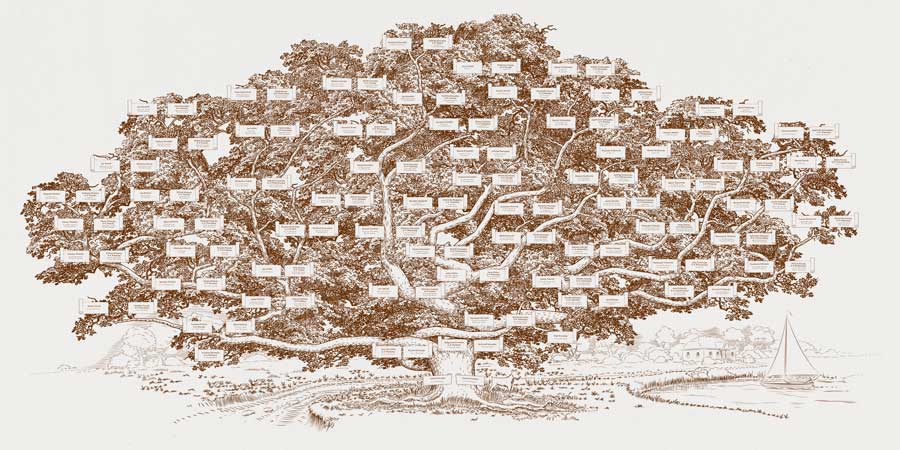
Short guide, which help you start your adventure with Polish genealogy.
Family archive — start with yourself
It is the exact place, where you should begin your genealogical research. Before you start looking for family memorabilia (documents, files, photos), you better spend some time with original sources – family stories, especially those, passed by the oldest members. It’s about time, before they get lost – good idea is to record them. Recording will allow you to confront your family knowledge with historical sources.
Family archives contain information about your family’s assets and properties, and also many documents concerning earlier generations. Besides documents, very important are photos – they often give you answers for the most nurturing questions. The biggest problem with the photos is the fact, that sometimes they are not signed, and we don’t know who exactly is depicted on them. But family meetings are great opportunities to fulfil this gaps (preferably with the pencil on the back of the photo!). Useful information could be find on family gravestones, too.
Sources
When you perform genealogical research, the most of the time you spend working with documents. During your search you will have to read a tones of a different kinds of files, such as: birth certificates, marital certificates, death certificates, population censuses, court and notary records, school and university documents, military files, and those created by many institutions and organizations. Going into details:
Certificates – base of your family tree
Listed earlier certificates – baptismal (birth), marriage and death. The oldest Polish documents of this kind come from the XVI century. In Poland keeping books with said files became mandatory after the Council of Trent (1545-1563). Priests were gathering dates of all baptisms (along with the dates of birth) and marriages – later they also started keeping dates of deaths. Since 1607 (according to the resolution of provisional council of Piotrków), parsons had to keep books with dates of confirmations and lists of parishioners. So, since the XVII century, in every parish had to be five kinds of books. Often they were also writing down the cause of death. In several Polish parishes all those documents were kept before the Council of Trent – for example in St. Mary’s Basilica in Kraków.

Method of keeping books changed after the partition of Poland. Certificates became the official public documents. Way of writing data down depended of the laws of the invasive countries.
During the interwar period all regulations were unified. After World War II civil marriages were introduced. New regime established also civil registration.
Civil registration offices have a duty to keep civil status file: birth certificates for 100 years, marriage and death certificates – for 80 years. Then they pass it to state archives. Parishes still possess their own certificates. They don’t have to transfer them to state archives, instead they make copies and pass them to diocesan archives.
Church books
Many valuable genealogical information may be find in parishes and monasteries. Typical documents, that are kept there: announcements, parishioners lists, confirmation lists, or information concerning charity organisations. Monastery books may also be very helpful in your genealogical research – they contain data about monks and local nobility.
Censuses
Other important information might be kept in different kinds of censuses. First census in Poland were conducted in 1791. Data collected in censuses: dates of birth, marriage certificates, names of the parents, professions and places of residence. Since 1861 municipal offices were obliged to keep censuses in two copies. First census in independent Poland was conducted in 1921.

Tax Registers are also very useful. They can say a lot about property status and place of residence of your ancestors. These documents belong to another archive. Specific data, concerning whole families, kept in register books, contain: names, surnames, parents’ names, professions, actual positions, dates of birth, confession, nationality and place of residence. Census sheets, documents and application for passports and identity card are also treated as valuable sources.
Court and military files
These types of documents contain many useful information, such as: personal data of the owners and family members, debts, testaments and short term debentures. So, they can be helpful in searching for long-lost relatives or ancestors. Military files are similarly specific records. Besides standard survey, they contain information about education, places of residence or recruit plans for the future (after the end of his service). Most of military documentation can be found in Wojskowe Biuro Historyczne (Military Historical Institute) in Warsaw:
www.wbh.wp.mil.pl/pl/index.html
Documents on the internet

Every year, more and more records and books is being digitalized and put in databases — including internet ones. Of course, there is not one repository, containing all of them — you will probably have to search through different archives, before you find the document you need. First of all:
Szukajwarchiwach.pl – website run by Narodowe Archiwum Cyfrowe (National Digital Archives). It contains scans and description of archival materials gathered in Polish archives. There are over 23 million documents, and counting. Among them you will find birth certificates and other civil status files.
It’s important to mention, that not all state archives are gathered in this program. For example: documents from Wrocław archives are on this website: www.ap.wroc.pl/atom
Geneteka – nation database of indexes of registry books. This project is coordinated by Polskie Towarzystwo Genealogiczne (Polish Genealogical Society). Its really huge archive. Creators of Geneteka are also trying to connect it with other databases — if any of record is missing, researcher might be redirected to specific archive, where said record is kept.
Repositories of other genealogical organizations
Organisations smaller than Polish Genealogical Society also gather their documents and share them via their websites. For example:
- Towarzystwo Genealogiczne Ziemi Częstochowskiej
- Małopolskie Towarzystwo Genealogiczne
- Wielkopolskie Towarzystwo Genealogiczne Gniazdo
- Pomorskie Towarzystwo Genealogiczne
- Lubelskie Korzenie
- Family Search – Mormons’ database
In the ‘70 and ‘80, members of The Church of Jesus Christ of Latter-day Saints conducted great action of microfilming birth certificates from state and church archives, among others – in Central and Eastern Europe countries. They gathered a huge number of documents. Many of them were digitalized later. Some of these files are available in internet (www.familysearch.org), some can be accessed only in Mormon Centers.
Poznań Project
Poznań Project aim to index all XIX-century marriages from the territory of historical Greater Poland. Since 2000 they managed to collect more than half of million records, but work is not over. Employees, working on this project estimate, that they gathered about ¾ of all files, so far.
Of course, there are many other sources. Those, mentioned earlier will help you get into the amazing world of genealogy. As your family tree will grow, it will be easier for you to obtain other valuable sources.
Kinga Borowiec
Your Roots in Poland



 USD
USD  AUD
AUD  CAD
CAD  NZD
NZD  EUR
EUR  CHF
CHF  GBP
GBP 





